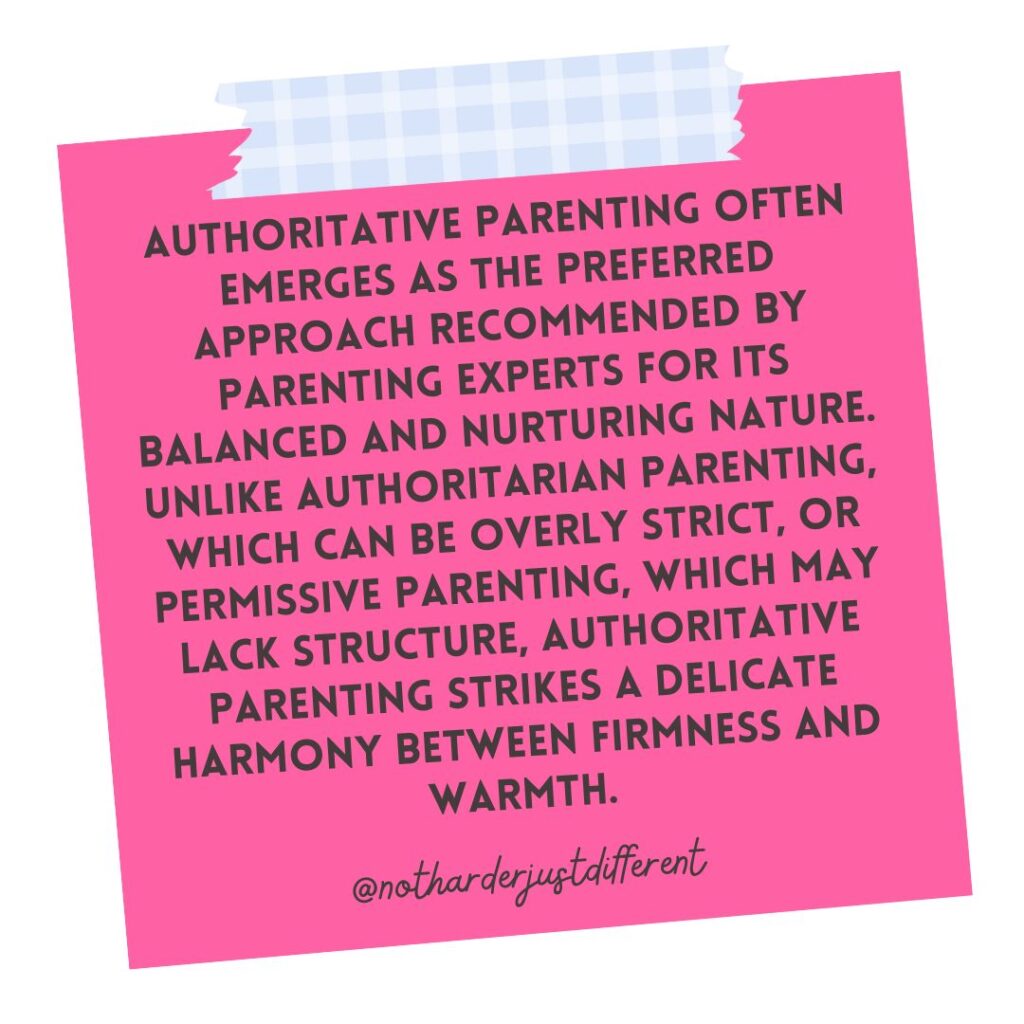Disclaimer: As a future Licensed Clinical Social Worker (LCSW) currently pursuing my master’s degree, I am passionate about sharing insights and information related to parenting, autism and homeschooling based on my personal experiences and research. However, the content shared on this blog is not intended to substitute professional advice, diagnosis, or treatment. Parenting is a deeply personal journey, and while I strive to provide valuable insights, every family and situation is unique. Readers are encouraged to consult with qualified professionals for personalized guidance tailored to their specific needs and circumstances.
Parenting is an adventure full of twists and turns, especially when raising a child with autism. If you’re anything like me, we often find ourselves questioning if we’re doing the right thing, especially when it comes to our parenting. Understanding different types of parenting styles can shed light on what works best for our children on the spectrum.
Maybe you’ve had a moment where you’re at a bustling playground, watching other parents interact with their children. Some are laid-back, letting their kids explore freely, while others maintain stricter boundaries. These diverse approaches reflect various parenting styles, each with its own strengths and considerations, especially in the context of autism.
So, let’s chat about parenting styles and how they apply to raising children with autism. From authoritative to permissive, each style brings unique dynamics to the table. By exploring these methods, we can tailor our parenting approach to suit our child’s individual needs and foster a supportive environment where they can thrive.

Parenting Styles for a Child with Autism
Authoritative Parenting
Authoritative parenting stands out as a harmonious blend of warmth and structure. This is a parent who sets clear expectations yet remains empathetic and responsive to their child’s emotions. For children with autism, this balance is crucial. They thrive in environments where routines offer predictability, yet there’s room for understanding and adjustment. Authoritative parents establish boundaries with empathy, recognizing that their child’s perspective is just as important as their own. This style fosters a sense of security and confidence, allowing children on the spectrum to navigate challenges with resilience and grace.
Permissive Parenting
A permissive parent is one who encourages their child to follow their interests, even if it means coloring outside the lines. While autonomy is essential for all children, those with autism may need additional guidance in understanding the boundaries of their newfound freedom. Permissive parents walk a fine line, balancing independence with responsibility. For children on the spectrum, this style can be empowering, offering them opportunities to explore their passions and develop their unique strengths.
Authoritarian Parenting
An Authoritarian parent is one who lays down the law, expecting unwavering obedience from their child. Rules are non-negotiable, and consequences are swift for any deviation. While structure is undoubtedly important, children with autism may find the rigid demands of authoritarian parenting challenging to navigate. For them, flexibility and understanding are essential ingredients for growth. Authoritarian parents may inadvertently overlook their child’s unique needs in pursuit of compliance, potentially hindering their emotional development.
Uninvolved Parenting
An Uninvolved (or Disengaged, as it is sometimes called) is a parent who remains aloof, showing minimal interest in their child’s life and experiences. For children with autism, whose social and emotional development often requires additional support, uninvolved parenting can exacerbate feelings of isolation and insecurity. These children crave connection and understanding, yet they may find themselves navigating their journey alone. Uninvolved parents may unintentionally neglect their child’s needs, unaware of the profound impact of their absence.

Authoritative Parenting: Striking a Balance
Authoritative parenting often emerges as the preferred approach recommended by parenting experts for its balanced and nurturing nature. Unlike authoritarian parenting, which can be overly strict, or permissive parenting, which may lack structure, authoritative parenting strikes a delicate harmony between firmness and warmth. This style encourages open communication, mutual respect, and understanding between parent and child, fostering a supportive environment where children feel both secure and valued. By setting clear expectations while remaining responsive to their child’s emotions and needs, authoritative parents provide a framework for growth and development that promotes autonomy and independence. Furthermore, authoritative parenting allows children to learn from their mistakes while still feeling supported, fostering resilience and self-confidence as they navigate life’s challenges. Its adaptive and empathetic approach not only strengthens the parent-child bond but also lays the foundation for healthy emotional and social development, making it a cornerstone of effective parenting strategies endorsed by experts in the field.
Additional Resources
To be honest, I spent an entire semester in undergrad (My bachelor’s is in Marriage and Family Studies) dissecting each of the parenting styles and understanding the pros and cons of each. I could never summarize all that in 1 blog post. I wanted to leave you with some good books for further research if you’re thinking “I don’t even know where to begin!”
- “The Whole-Brain Child: 12 Revolutionary Strategies to Nurture Your Child’s Developing Mind” by Daniel J. Siegel and Tina Payne Bryson
- “Parenting with Love and Logic: Teaching Children Responsibility” by Foster Cline and Jim Fay
- “How to Talk So Kids Will Listen & Listen So Kids Will Talk” by Adele Faber and Elaine Mazlish
- “The Explosive Child: A New Approach for Understanding and Parenting Easily Frustrated, Chronically Inflexible Children” by Ross W. Greene
- “Parenting from the Inside Out: How a Deeper Self-Understanding Can Help You Raise Children Who Thrive” by Daniel J. Siegel and Mary Hartzell
- “The 5 Love Languages of Children: The Secret to Loving Children Effectively” by Gary Chapman and Ross Campbell
- “Positive Discipline: The Classic Guide to Helping Children Develop Self-Discipline, Responsibility, Cooperation, and Problem-Solving Skills” by Jane Nelsen, Ed.D.
- “Peaceful Parent, Happy Kids: How to Stop Yelling and Start Connecting” by Laura Markham
- “No-Drama Discipline: The Whole-Brain Way to Calm the Chaos and Nurture Your Child’s Developing Mind” by Daniel J. Siegel and Tina Payne Bryson
- “Parenting with Purpose: How to Raise Well-Behaved Children and Build a Strong, Happy Family” by Lynn R. Owens
Exploring the different parenting styles and understanding their implications for children with autism is a journey of discovery and growth. While each style brings its own strengths and considerations, authoritative parenting often emerges as the best, according to research and personal experience, offering a balanced approach that prioritizes empathy, communication, and mutual respect. By embracing flexibility and understanding, parents can tailor their approach to meet their child’s unique needs, fostering an environment where they can thrive and flourish. As we navigate the complexities of parenting a child with autism, let us remember that there is no one-size-fits-all solution. Instead, it is through love, patience, and a willingness to learn and adapt that we can create meaningful connections and support our children in reaching their full potential.

